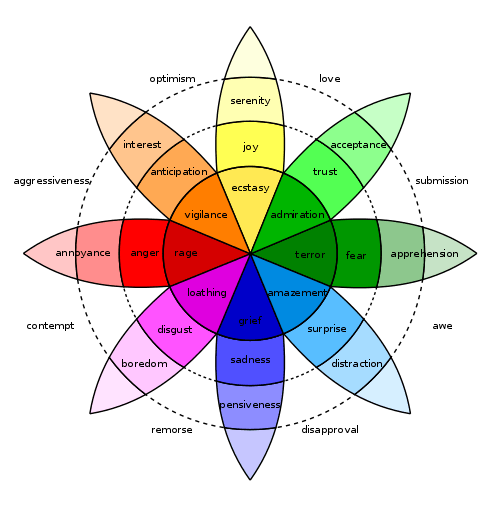Hatred
Hatred or hate is a deep and extreme emotion-based dislike, especially invoking feelings of anger or resentment. It can be directed against individuals, groups, entities, objects, behaviors, or ideas. Hatred is often associated with feelings of anger, disgust and a disposition towards hostility.
Ethnolinguistics
James W. Underhill, in his Ethnolinguistics and Cultural Concepts: truth, love, hate & war, (2012) discusses the origin and the metaphoric representations of hate in various languages. He stresses that love and hate are social, and culturally constructed. For this reason, hate is historically situated. Although it is fair to say that one single emotion exists in English, French (haine), and German (Hass), hate varies in the forms in which it is manifested. A certain relationless hatred is expressed in the French expression J'ai la haine, which has no equivalent in English. While for English-speakers, loving and hating invariably involve an object, or a person, and therefore, a relationship with something or someone, J'ai la haine (literally, I have hate) precludes the idea of an emotion directed at a person. This is a form of frustration, apathy and animosity which churns within the subject but establishes no relationship with the world, other than an aimless desire for destruction. Underhill (following Philippe Roger) also considers French forms of anti-Americanism as a specific form of cultural resentment.
Psychoanalytic views
In psychoanalysis, Sigmund Freud defined hate as an ego state that wishes to destroy the source of its unhappiness.[1] More recently, the Penguin Dictionary of Psychology defines hate as a "deep, enduring, intense emotion expressing animosity, anger, and hostility towards a person, group, or object."[2]
Neurological research
The neural correlates of hate have been investigated with an fMRI procedure. In this experiment, people had their brains scanned while viewing pictures of people they hated. The results showed increased activity in the middle frontal gyrus, right putamen, bilaterally in the premotor cortex, in the frontal pole, and bilaterally in the medial insular cortex of the human brain.[3]
Legal issues
In the English language, a hate crime (also known as a "bias-motivated crime") generally refers to criminal acts which are seen to have been motivated by hate. Those who commit hate crimes target victims because of their perceived membership in a certain social group, usually defined by race, gender, religion, sexual orientation, mental disorder, disability, class, ethnicity, nationality, age, gender identity, or political affiliation.[4] Incidents may involve physical assault, destruction of property, bullying, harassment, verbal abuse or insults, or offensive graffiti or letters (hate mail).[5]
Hate speech is speech perceived to disparage a person or group of people based on their social or ethnic group,[6] such as race, sex, age, ethnicity, nationality, religion, sexual orientation, gender identity, mental disorder, disability, language ability, ideology, social class, occupation, appearance (height, weight, skin color, etc.), mental capacity, and any other distinction that might be considered a liability. The term covers written as well as oral communication and some forms of behaviors in a public setting. It is also sometimes called antilocution and is the first point on Allport's scale which measures prejudice in a society. In many countries, deliberate use of hate speech is a criminal offence prohibited under incitement to hatred legislation. It is often alleged that the criminalization of hate speech is sometimes used to discourage legitimate discussion of negative aspects of voluntary behavior (such as political persuasion, religious adherence and philosophical allegiance). There is also some question as to whether or not hate speech falls under the protection of freedom of speech in some countries.
Both of these classifications have sparked debate, with counter-arguments such as, but not limited to, a difficulty in distinguishing motive and intent for crimes, as well as philosophical debate on the validity of valuing targeted hatred as a greater crime than general misanthropy and contempt for humanity being a potentially equal crime in and of itself.
Religious perspectives
Old Testament
The Hebrew word describing David’s "perfect hatred" (KJV) means that it "brings a process to completion".[7]
See also
| Look up hatred or hate in Wiktionary, the free dictionary. |
| Wikiquote has quotations related to: Hatred |
References
- ↑ Freud, S. (1915). The instincts and their vicissitudes.
- ↑ Reber, A.S., & Reber, E. (2002). The Penguin dictionary of psychology. New York: Penguin Books.
- ↑ Zeki, S.; Romaya, J.P. (October 2008). Lauwereyns, Jan, ed. "Neural Correlates of Hate". PLoS ONE. 3 (10): e3556. doi:10.1371/journal.pone.0003556. PMC 2569212. PMID 18958169. Archived from the original on January 3, 2009.
- ↑ Stotzer, R.: Comparison of Hate Crime Rates Across Protected and Unprotected Groups, Williams Institute, 2007–06. Retrieved on 2007-08-09.
- ↑ Hate crime Archived November 26, 2005, at the Wayback Machine., Home Office
- ↑ "Dictionary.com: Hate speech". Dictionary.reference.com. Retrieved 2012-12-07.
- ↑ Harris, R Laird (10/01/2003). Theological Wordbook of the Old Testament. Moody Publishers; New Edition. ISBN 0802486495. Check date values in:
|date=(help)
Further reading
| Wikimedia Commons has media related to Hate crimes. |
- The Psychology of Hate by Robert Sternberg (Ed.)
- Hatred: The Psychological Descent into Violence by Willard Gaylin
- Why We Hate by Jack Levin
- The Psychology of Good and Evil: Why Children, Adults, and Groups Help and Harm Others by Ervin Staub
- Prisoners of Hate: The Cognitive Basis of Anger, Hostility, and Violence by Aaron T. Beck
- Becoming Evil: How Ordinary People Commit Genocide and Mass Killing by James Waller
- Ethnolinguistics and Cultural Concepts: truth, love, hate & war, by James W. Underhill, Cambridge: Cambridge University Press.
- "Hatred as an Attitude", by Thomas Brudholm (in Philosophical Papers 39, 2010).
- The Globalisation of Hate, (eds.) Jennifer Schweppe and Mark Walters, Oxford: Oxford University Press.
